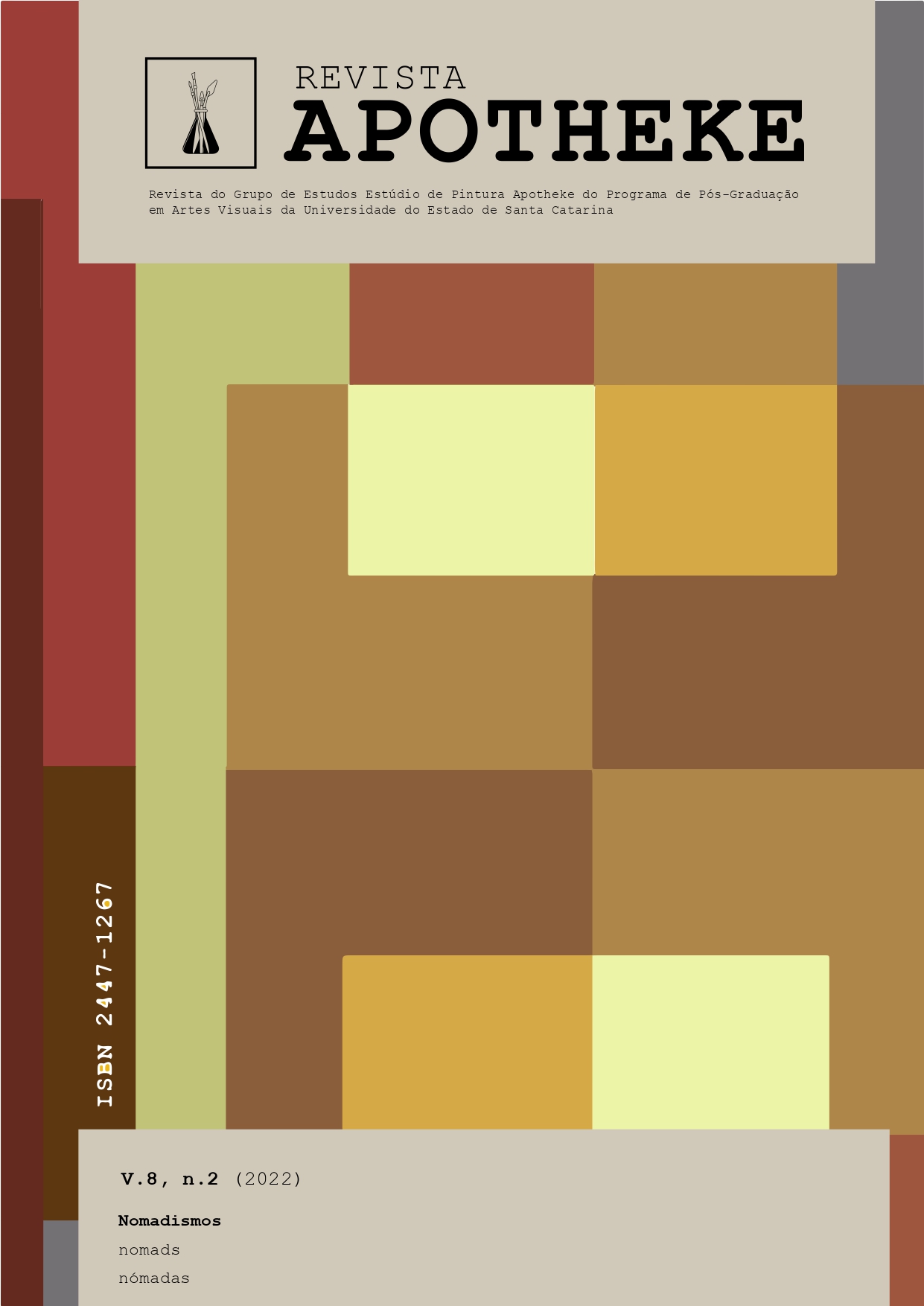Nomadic figurations in digital manipulations: experimentations of a State of Teaching in Visual Arts
DOI:
https://doi.org/10.5965/24471267822022069Keywords:
Subjectivation Processes, Faciality, SelfieAbstract
Concerned with the formation of subjectivity, this article seeks to reflect on the nomadic practices in the experiments carried out in a Teaching Internship in the Digital Art discipline of the Visual Arts course at the State University of Maringá (UEM). From a selfie, the students were encouraged to manipulate the photographs in editing software (such as Photoshop) inspired by the artistic processes of drag. This proposal starts from a rhizomatic approach to the curriculum, allowing it to be crossed by issues brokered by its outside. Thus, we bring to this discussion the concepts of nomadic figurations, a kind of political map that allows us to understand the processes of contemporary subjectivation, and faciality, a control machine that, through the formation of a face, inserts us into closed territories of experience. The manipulation of digital images, in addition to the coercive processes of body control, is used in our proposal as a practice of the self with the ability to organize nomadic movements for the formation of a more libertarian subjectivity.Downloads
References
AGAMBEN, Giorgio. O que é um dispositivo? In AGAMBEN, Giorgio: O que é o contemporâneo? e outros ensaios. 6ª. ed. Trad. Vinicius Nicastro Honesko. Chapecó/SC: Argos, 2009. p. 8-51
BARRIONUEVO, Gustavo. STUBS, Roberta. A ficção como potência para subjetividades pós-identitárias: pensando uma figuração drag. Revista de Educação e Complexidade. Cianorte/PR, n.5, p. 73-91, dez, 2017. Disponível em: http://www.crc.uem.br/departamento-de-pedagogia-dpd/koan-revista-de-educacao-e-complexidade/edicao-n-5-dez-2017. Acesso: 10 jun. 2022.
BRAGA, Paula. Arte Contemporânea: modos de usar. São Paulo: Elefante, 2021.
BRAIDOTTI, Rosi. Diferença, Diversidade e Subjetividade Nômade. Revista Labrys, Estudos Feministas, n. 1-2, Brasília: Montreal: Paris - Julho/Dezembro de 2002, p. 1-16.
CASTELEIRA, Rodrigo Pedro. (Des)pregamentos e Táticas nos Cotidianos Narrados por Travestis: Desalojamentos nos espaços prisionais como modos de (r)existências. 111 f. Tese (Doutorado em Educação) – Pós-Graduação em Educação. Universidade Estadual de Maringá. Maringá, 2018.
DELEUZE, Gilles. GUATTARI, Felix. Mil Platôs: capitalismo e esquizofrenia 2, vol. 1. São Paulo: Editora 34, 2011.
DELEUZE, Gilles. GUATTARI, Felix. Mil Platôs: capitalismo e esquizofrenia 2, vol. 3. São Paulo: Editora 34, 2012.
GALLO, Silvio. Deleuze & Educação. 3. Ed. Belo Horizonte: Autêntica, 2017.
GUATTARI, Felix. ROLNIK, Suely. Micropolítica: cartografias do desejo. Petrópolis/RJ: Vozes, 1996.
IRWIN, Rita. A/r/tografia. In: DIAS, Belidson. IRWIN, Rita L. (Orgs.). Pesquisa Educacional Baseada em Arte: A/r/tografia. Santa Maria/RS: Ed. da UFSM, 2013, p. 21-26.
KIRST, Patrícia Beatriz Argôllo Gomes. FONSECA, Tânia Mara Galli. A imagem digital como dispositivo de apropriação dos modos de subjetivação contemporâneos. Psicologia em Estudo. Maringá. v.15, n.2, 2010. p. 401-408. Disponível em: https://doi.org/10.1590/S1413-73722010000200019. Acesso em: 29 de set. 2020.
MAIO, Eliane Rose. O começo dessa história: discussões iniciais sobre gênero. In: RIBEIRO, Marcos (Org.). A conversa sobre gênero na escola: aspectos conceituais e político-pedagógicos. Rio de Janeiro: Wak, 2019. p. 17-30.
SIQUEIRA, Juliano Reis. Estágio em Artes Visuais como campo de pesquisa. Apotheke, Florianópolis, v. 8, n.1, p. 30- 43, abril, 2022. Disponível em: https://www.revistas.udesc.br/index.php/apotheke/article/view/21814. Acesso em: 6 jun. 2022.
SONTAG, Susan. Sobre Fotografia. São Paulo: Companhia das Letras, 2004.
VIEIRA, Renata de Almeida. Formação Pós-Graduada e Docência no Ensino Superior: mapeamento das discussões sobre o Estágio de Docência na RBPG/CAPES. Contra-pontos, Itajaí, v. 13, n. 2, p. 94 – 101, mai-ago, 2013. Disponível em: https://doi.org/10.5965/24471267812022028. Acesso em: 1 jun. 2022.
Downloads
Published
How to Cite
Issue
Section
License
Copyright (c) 2022 Gustavo Barrionuevo, Eliane Maio, Roberta Stubs

This work is licensed under a Creative Commons Attribution-NonCommercial 4.0 International License.
Copyright and Licensing Policy
Authors of works submitted to Revista APOTHEKE authorize their publication in both print and digital formats exclusively for academic purposes. Reproduction is permitted, provided that the source is properly cited. Authors confirm the originality, authorship, and unpublished status of their manuscripts.
Articles published by the journal are freely available and intended for academic and non-commercial use only. All copyrights are transferred to the journal. The content of signed articles reflects the views of their respective authors and not the official position of Revista Apotheke. The author(s) agree to always cite the following reference when republishing or referring to the content originally published in Revista Apotheke:
“This article was originally published by Revista Apotheke in volume (insert volume), number (insert number), year (insert year), and is available at: http://www.revistas.udesc.br/index.php/APOTHEKE/index”
It is the sole responsibility of the authors to obtain written permission for the use of any material protected by copyright law included in their articles. Revista Apotheke is not responsible for copyright infringements committed by contributors.
Authors retain copyright and grant the journal the right of first publication, with the work licensed under a Creative Commons Attribution-NonCommercial License (CC BY-NC):
-
Attribution (BY): Licensees are allowed to copy, distribute, display, perform, and create derivative works, provided that proper credit is given to the author or licensor, in the manner specified.
-
NonCommercial (NC): Licensees may use the material only for non-commercial purposes.
After publication, authors retain the rights to their work and may republish the text.



